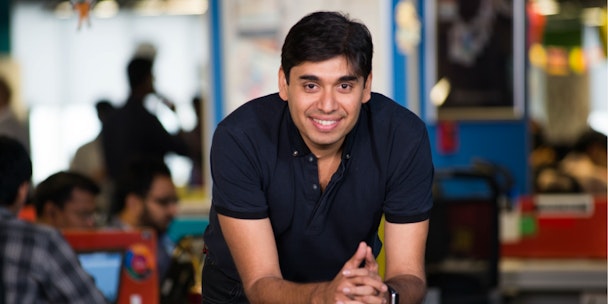InMobi wants to break television dominance in Indonesia and keep Facebook and Google in check
Indonesia is a country that has some of the world’s most digitally savvy citizens and is tipped to become “Asia’s digital economic powerhouse” with 73% of total Internet users accessing it through mobile. However, television advertising is still king in Indonesia with high penetration, while mobile advertising is playing catch up.

Naveen Tewari, founder and chief executive officer of mobile advertising platform InMobi.
What then, should marketers do when it comes to deciding on whether to allocate their budget to television or mobile advertising? Naveen Tewari, founder and chief executive officer of mobile advertising platform InMobi, feels that a strategy with a good mix is important, but with mobile as the priority.
Speaking to The Drum on the sidelines of the InMobi Impressions 2017 conference in Jakarta, Tewari said: “Television advertising is large in Indonesia, but mobile advertising now has reached a similar scale. So now, in Indonesia, television advertising reaches about 119 million users and mobile advertising, through us, reaches more than 100 million users.
“So while the scale has not reach the heights of television, it is very fast approaching it. In the last five years, television advertising has declined about 5% a year. It is only a matter of time before mobile advertising eclipses or becomes as large as television advertising.
“From a marketer's point of view, I think they need to make use of both television and mobile advertising, because television creates a strong brand perception and mobile helps that brand perception, but more importantly, creates the mid-to-bottom funnel purchase intent.
“How much should you allocate to each medium depends on who you are, so for example, if you are a digital-first, mobile-first company, then it will be 80/20 in favour of digital. If you are a traditional company, I think you need to get to around 60% traditional and 40% mobile. If you are a digital-first company, then you have to go 80% mobile.”
The Impressions event, which gathered brands and platforms of all sizes to talk about a mobile-first Indonesia, is one of the many ways that InMobi can help push marketers in Indonesia to fully embrace mobile advertising, explained Tewari.
He added that InMobi is also actively trying to promote brand safety to provide assurance to marketers who are afraid of fraud in mobile advertising.
“One is education and events like these where you give talks. Secondly, it is showing them results,” explained the Indian national.
“What is happening today, because this is a fast growing industry, there are many smaller platforms that come out there and they are not able to deliver results, which leaves the marketer confused about what is happening.
“Therefore, large platforms like us come and talk about many things and say "Look, we are a one stop shop for you and you can do many things through us." It helps them to get better results this way.
“Thirdly, it is very important for transparency and for fraud not to be there. We standby those principles very strongly, because in a new industry, those things tend to happen. We try to prevent it to give comfort to the marketer.”
In his keynote address to attendees before the start of the conference, Tewari made the dominance of Google-Facebook duopoly in digital advertising his first topic, where he stressed the need to keep them in check.
In addition, he called on companies to ‘build open spaces, not walled gardens’ by exploring other platforms to advertise on, other than just Google and Facebook.
Explaining the reasoning behind his call to arms, Tewari explained that is important to keep them in check for the whole advertising ecosystem, if not ad prices will go up and everyone will suffer.
He also noted that it has happened already, with search prices skyrocketing and becoming unaffordable to advertisers.
“The way to do that is to be conscious that two or three platforms have been used and not just one or two,” said Tewari.
“I'm sure they will give short-term baits to companies, don't take it and put in more effort to work with other companies.
“We are all committed to creating a 'third-front' and this is what this event is all about.
The presence of Amazon and Alibaba in Southeast Asia can help break the duopoly as both ecommerce companies are becoming publisher platforms, but Tewari cautioned that it is still early days.
“The story is yet to play out. The argument is certainly true that they can, but Amazon has yet to launch in Indonesia and it will take them at least five years to make that happen. We are also already working with Alibaba-Lazada to mobile advertising,” explained Tewari.
“They (Amazon) are good in advertising, but we (InMobi) have been in Indonesia for more than eight years.”
At the event, InMobi also launched a new platform that comes with an advanced creative authoring tool that helps marketers create more interactive mobile video ads at scale using pre-existing video assets.

